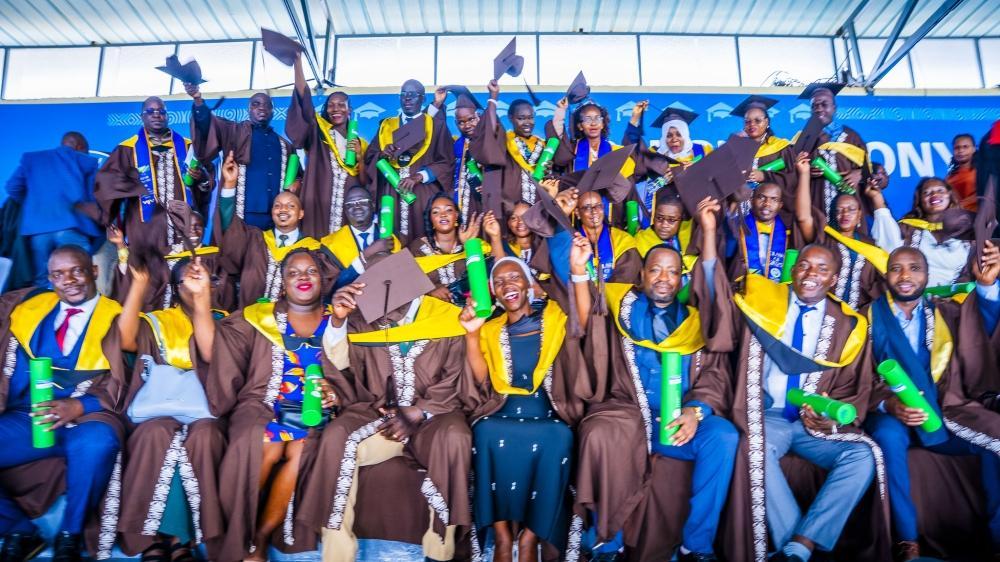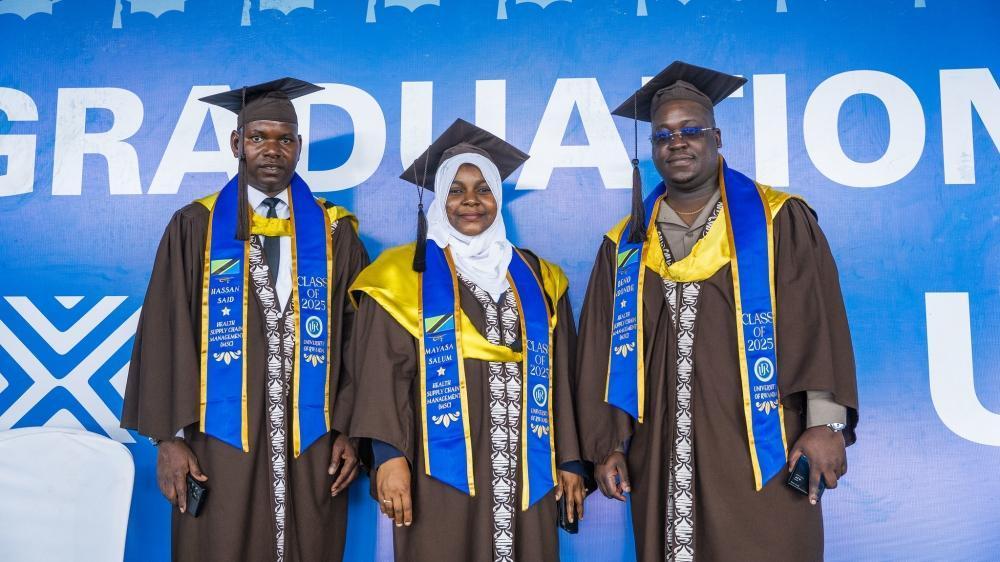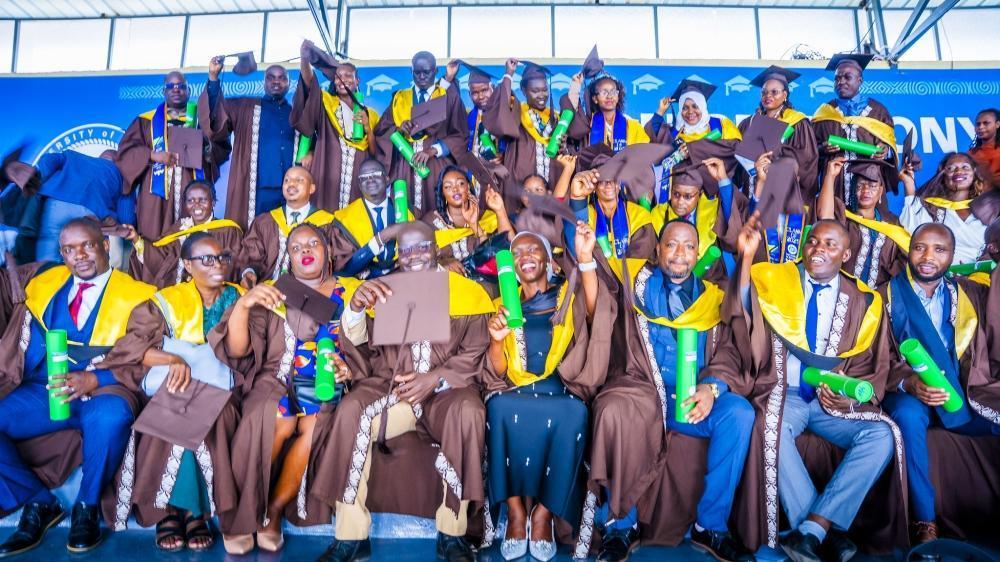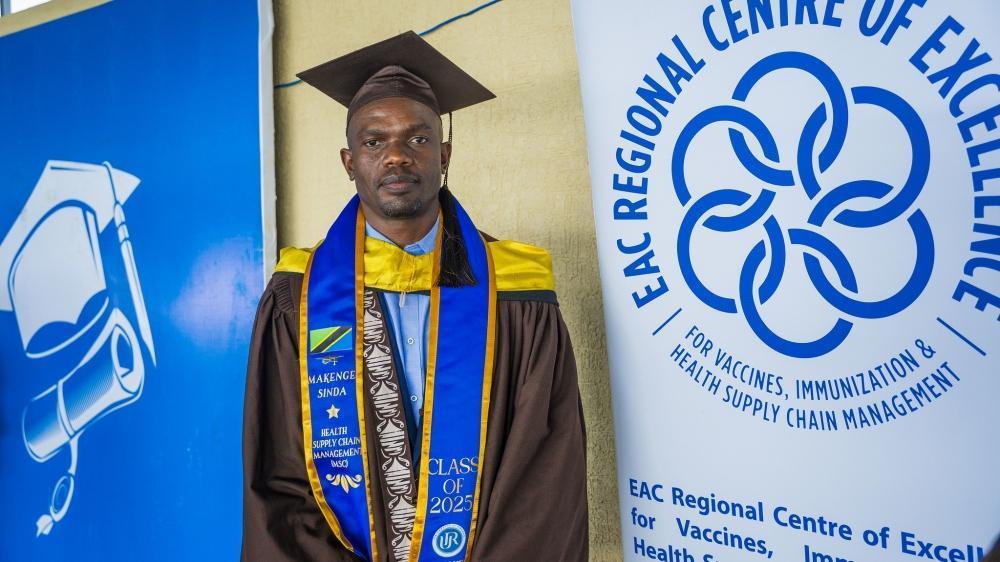Africa-Press – Rwanda. Graduates from across the East African Community have hailed the EAC Regional Centre of Excellence for Vaccines, Immunization and Health Supply Chain Management, based at the University of Rwanda (UR), for equipping them with the skills to strengthen health supply chain systems to ensure commodities security in their respective countries.
The health supply chain experts, who are part of the fifth cohort of the Master’s in Health Supply Chain Management (MHSCM) programme, spoke following University of Rwanda’s 11th graduation ceremony held on Friday, October 18, 2025, at Huye Campus.
A total of 38 candidates from different EAC Partner States were awarded their master’s degrees, marking great progress in both the graduates’ professional journeys and the Centre’s mission to address human capital development in health supply chain management across the region.
Director of the Centre Patrick Mwesigye congratulates somo of the 38 graduates at the geaguation ceremony in Huye. They were part of the University of Rwanda’s 11th graduation ceremony held on Friday, October 18, 2025, at Huye Campus. Photos by Kellya Keza
Speaking during the graduation ceremony, the graduates said the programme had not only professionalised health supply chain management but also built a strong network of experts committed to improving access to vaccines and essential medicines across the region.
Pauline Otambo, a pharmacist from Kenya who graduated with a master’s degree in Health Supply Chain Management, described the day as a major milestone.
“Everything has gone perfectly according to schedule. We are truly grateful to the German government through KfW and East African Community Secretariat for supporting this programme which, through this Centre of Excellence, brought together graduates from Kenya, Uganda, South Sudan, Tanzania, Rwanda, and Burundi. Personally, I’m very thankful to the Government of Rwanda for providing such a supportive environment that allowed us to learn and grow,” she said.
She said the Centre helped her see health supply chain management as a profession in its own right.
“It has helped me a lot. As a pharmacist working in the health supply chain, I realised that although we were doing the work, it was not as structured or professionalised as it should be. This course has taught us how to manage the health supply chain in an organised and timely manner, ensuring medicines and health commodities reach the right place, at the right time, and in the right quantities,” she said.
Otambo added that the Centre provided a platform for professionals from the region to learn together, share experiences, and build regional collaboration.
“We now consider ourselves an East African family of health supply chain experts. Together, we aim to strengthen systems and make a real impact on supply chain management in our countries,” she said.
From Tanzania, Sinda Makenge, another master’s graduate in the same field, said the Centre had filled a critical gap in professional training.
The health supply chain experts are part of the fifth cohort of the Master’s in Health Supply Chain Management (MHSCM) programme. Photo by Kellya Keza
He said he joined the Centre to strengthen his managerial capacity in order to better manage the health supply chain in Tanzania.
He is currently working as a supply chain manager.
“I needed more technical expertise. In my country, this kind of course isn’t available. Fortunately, Rwanda offers it with scholarship opportunities. It’s also a peaceful country with skilled lecturers and a conducive learning environment. Studying alongside experts from other East African countries allowed us to share experiences and find common solutions to the challenges in our workplaces,” he said.
The Centre has strengthened their ability to deliver better health outcomes for patients, he explained.
Makenge said he intends to apply his new knowledge to improve the efficiency of supply chain systems in Tanzania.
“We have learned that East African countries face similar challenges. We will apply the knowledge we gained to make our health supply chains more efficient through shared experiences, integrated systems and regional collaboration,” he added.
From Uganda, Filda Agiro, another graduate, shared similar sentiments, highlighting that the Centre of Excellence has become a meaningful platform for improving health supply chain management.
“The Centre gives East African students an opportunity to gain knowledge in an area that is increasingly vital for our region. Most of us work in key government institutions such as regional referral hospitals, the Ministry of Health, the National Drug Authority, and Joint Medical Stores. These are key institutions in the supply chain system,” she said.
With the knowledge she gained, she said: “We can now improve medicine quantification, optimise distribution, and enhance the overall supply chains performance efficiency.”
Agiro reiterated that Rwanda’s selection as the host of the Centre of Excellence for Vaccines, Immunisation and Health Supply Chain Management has made it a regional hub for this needed expertise.
Addressing stock-outs and overstocking
Olivier Icyishatse, a Rwandan graduate in Health Supply Chain Management, said the experience he gained will help tackle challenges in the health supply chain in the region, of which Rwanda is a part.
“In our countries we face challenges in the health supply chain, including stock-outs and overstocking of medical equipment and medicines,” he said, attributing these issues to gaps in knowledge.
“Due to knowledge gaps in supply management, acquisition, planning, and forecasting, these problems persisted,” he explained.
University of Rwanda’s 11th graduation ceremony held on Friday, October 18, 2025, at Huye Campus. Photos by Kellya Keza
Reflecting on his learning at the Centre of Excellence, Icyishatse highlighted the tangible impact of the programme.
“With the knowledge we gained from the centre of excellence, we are now able to conduct proper planning and ordering, helping us manage stock-outs and overstock more effectively,” he testified.
Looking forward, he expressed his hopes for applying the skills he had received.
“The unique aspect was learning about the supply of medicines and health equipment. Previously, we faced challenges related to planning and procurement. We hope to apply this knowledge to improve supply management in general to properly plan and procure health supplies, including medicines and other equipment,” he added.
Building a skilled workforce
The programme, implemented under the East African Community Regional Centre of Excellence for Vaccines, Immunization and Health Supply Chain Management, through the University of Rwanda, aims to build a skilled workforce capable of managing health commodities efficiently and sustainably.
As the new graduates return home, they carry not only their degrees but also a shared commitment to strengthening the region’s healthcare through innovation, efficiency, and collaboration, said UR’s Vice Chancellor, Professor Didas Kayihura Muganga, during the graduation ceremony.
Muganga urged the graduates to value teamwork and diversity.
“The brightest ideas often emerge from collaboration.”
He encouraged the graduates to remain optimistic and resilient, viewing challenges as opportunities for innovation and growth.
Prime Minister Dr Justin Nsengiyumva, who was joined by the Minister of Education, senior government officials, university leaders, and parents at the graduation ceremony, called on researchers and innovators to align their work with the country’s priorities.
“Research must be purposeful. Innovation must be practical. Ideas must become solutions that create value for our communities,” he said.
The Director of the East African Community Regional Centre of Excellence for Vaccines, Immunizations and Health Supply Chain Management (EAC RCE-VIHSCM), John Patrick Mwesigye, noted that the EAC Regional Centre, under the University of Rwanda, is deeply committed to academic excellence, student-focused support, and strategic partnerships.
“Through these pillars, we continue to empower our students to excel and ensure that our programmes contribute meaningfully to healthcare in our region and beyond,” he said.
Courses offered by the Centre
The East African Community Regional Centre of Excellence for Vaccines, Immunization and Health Supply Chain Management offers a two-year modular course designed to build both technical expertise and managerial competencies among health supply chain professionals.
Graduates from across the East African Community have hailed the EAC Regional Centre of Excellence for Vaccines, Immunization and Health Supply Chain Management, based at the University of Rwanda (UR)
It is delivered through a blended learning approach, including face-to-face and online sessions, allowing students to continue working in their home countries while studying.
Since 2023, it has also offered a Master of Science in Pharmaceutical Analysis and Quality Assurance (MPAQA).
Since the programme’s inception in 2017, the University of Rwanda/East African Community Regional Centre of Excellence for Vaccines, Immunisation and Health Supply Chain Management (UR/EAC RCE-VIHSCM) has graduated 135 professionals through its first four cohorts.
This fifth cohort brings the total number of alumni to 173, contributing to a growing pool of highly skilled professionals in the field.
Starting November 2025, the Centre will expand its academic portfolio with the launch of two new graduate programmes: Master of Science in Vaccinology (MVAX) and Master of Science in Medical Products and Regulatory Affairs (MPRA).
Funding and regional impact
Since its inception, the Centre has been principally funded by the German Development Cooperation (BMZ) and the German Development Bank (KfW) through a series of grants.
In March 2022, BMZ committed an additional grant of €10 million to enable the Centre to create an enabling environment for vaccine manufacturing in the EAC through talent development.
Through this funding, the Centre offers scholarships valued at €15,000 per student to deserving public servants from EAC Partner States, awarded on an equal quota basis.
The East African Community Regional Centre of Excellence for Vaccines, Immunisation and Health Supply Chain Management (EAC RCE–VIHSCM), hosted by the University of Rwanda, is one of six EAC Regional Centres of Excellence for Skills and Tertiary Education in Higher Medical and Health Sciences Education, Health Services, and Research.
The Centre was established to contribute to the improved health of the people of the East African Community by building supply chain management capacity for EAC personnel and serving as a regional focal point for the introduction and dissemination of innovative and proven procedures in health supply chain management.
Sinda Makenge, a master’s graduate in Health Supply Chain Management

For More News And Analysis About Rwanda Follow Africa-Press










